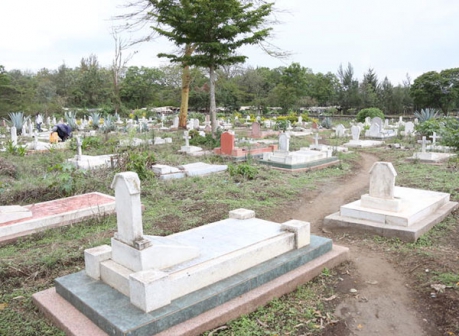
Pension firms have been advised to diversify their investments, including buying land to establish cemeteries. David Kinyua, a project investment consultant at Esham Park Ltd, says that institutional investors like pension funds should separate individual perceptions on particular investments from their viability.
“The nature of the project you invest in should primarily be driven by the return you expect. So, we have come across investments ranging from buildings, energy and even land banks for a final resting place,” he said last week during a property symposium in Nairobi.
He said pension funds trustees should consider investing in buying land for establishing cemeteries since there is a huge deficit of cemeteries in many counties. He called upon pension fund investors to invest where government infrastructure projects are likely to be undertaken since property values in such places normally register faster growth.
Kinyua told attendees to think of building go-downs, business sparks, city centre exhibitions, and office blocks.
Speaking at the same event, Jonathan Stichburry, managing director and chief executive of PineBridge Investments, said diversification of portfolios is key to realising high returns on investments.
“Diversification reduces risks and enhances returns. Most pension schemes concentrate on fixed-income and private equity. There are other opportunities with good returns like real estate property,” said Stichburry.
According to the Retirement Benefits Authority, the average Kenyan pension fund is focused on local equities and fixed-income investments, with 50 per cent of these being traditional asset classes.
RBA regulations permit investment in property, although Stichbury said there is little information available to pension schemes on how to invest in property for such firms.
A 2015 survey by Alexander Forbes Consulting Actuaries Schemes Survey on 378 schemes with a total of Sh535.8 billion revealed that only 7.4 per cent of their assets was allocated to property or real estate or private equity.
“On a weighted average basis, the average scheme invests 30.2 per cent of its assets in equities, 61.2 per cent in fixed-income, 7.4 per cent in property and 1.2 per cent in offshore,” said the survey. The pension schemes saw their returns from equities record a negative of 11 per cent, while returns from fixed-income stood at 7.8 per cent by December 2015 compared to 4.7 per cent as at September 2015.
In the past, Hass Property Index has consistently shown that property remains the best investment avenue compared to other asset classes like equities and bonds. Apart from Kenya, other countries like South Africa, Australia, United Kingdom, United States, and Hong Kong continue to record positive growth in real estate.
The index showed that land prices have increased by 503.1 per cent since December 2007.
To Knight Frank’s Kenya’s head of agency Anthony Havelock, pension funds should consider putting up Grade A offices, which have good returns, thanks to multinationals looking for such kind of office spaces.
Stay informed. Subscribe to our newsletter
 The Standard Group Plc is a
multi-media organization with investments in media platforms spanning newspaper
print operations, television, radio broadcasting, digital and online services. The
Standard Group is recognized as a leading multi-media house in Kenya with a key
influence in matters of national and international interest.
The Standard Group Plc is a
multi-media organization with investments in media platforms spanning newspaper
print operations, television, radio broadcasting, digital and online services. The
Standard Group is recognized as a leading multi-media house in Kenya with a key
influence in matters of national and international interest.
 The Standard Group Plc is a
multi-media organization with investments in media platforms spanning newspaper
print operations, television, radio broadcasting, digital and online services. The
Standard Group is recognized as a leading multi-media house in Kenya with a key
influence in matters of national and international interest.
The Standard Group Plc is a
multi-media organization with investments in media platforms spanning newspaper
print operations, television, radio broadcasting, digital and online services. The
Standard Group is recognized as a leading multi-media house in Kenya with a key
influence in matters of national and international interest.






